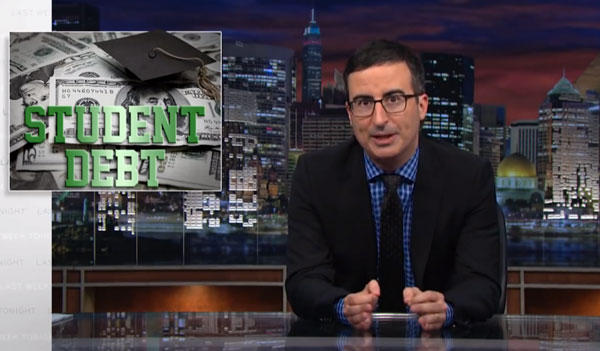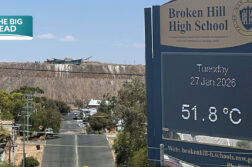“Let me speak right now to all current freshmen in college who have student loans. You need to stop watching this show right now, you don’t have time for this,” John Oliver cautioned his audience during a recent show.
It’s unusual to hear the host of a popular American talk show ask their audience to switch off. But Oliver, in his typically direct satirical style, was making a strong point.
Since launching his own program in April, Oliver has built on the work of fellow American comedians Jon Stewart and Stephen Colbert, using bombastic monologues to deliver a liberal critique of US politics and culture. In a nation where political farce and tragedy stalk each other, Oliver has used his satire to explore issues of race, incarceration, privatisation, net neutrality, and the wage gap.
This week he turned his focus to US college debt. You can watch the clip here.
With uncapped college prices, the total debt of US students now stands at over a trillion dollars.
“That’s right,” Oliver told his in-house audience, “student debt in the US is now bigger than debt from credit cards and auto-loans, and is second only to mortgages.”
And this is the reason the Brit-come-Yank decided to address the university students in his audience directly.
“Get out there and enjoy the fuck out of your college experience because you may be paying for it for the rest of your life,” he said.
“I’m serous; drink beer from a funnel, kidnap a mascot, find out if you’re gay or not and even if you’re not have some gay experiences, become that weird guy on campus who rides a unicycle from class to class, find out whoever the Winklevoss twins of your school are and steal their idea for a website, and shoot fireworks out of every bodily orifice you can fucking find.”
“Please, make sure your colleges years are the best ones of your life, because thanks to the debt we are saddling you with, they almost certainly will be.”
Oliver’s delivery was, as always, bolstered by hyperbole.
But the substance of his critique was spot-on, and it should send a shiver down the spine of every Australian following Education Minister Christopher Pyne’s attempts to deregulate our own higher education system (never mind that Pyne, like his colleague Joe Hockey, built his early political career on opposing higher university fees).
In the great deregulation wars of 2013-2014, those in favour of uncapping the cost of higher education in Australia and letting student debt run free have had one particularly effective weapon in their arsenal: uncertainty.
The legislation currently before parliament is an experiment that will transform a sector and the fortunes of the next generation of Australians, but vital questions about the precise impacts have been left unanswered by the government, and given them wiggle room to sell the deeply unpopular package.
How much will course fees go up when caps are removed? Who will bear the brunt of increases? What will happen to small and rural campuses? Will private for-profit colleges be able to rort the system?
Indications so far are; a lot; women; likely close, and; it shouldn’t be too hard.
Looking at the US system provides further clues.

Key to driving the explosion of debt has been the growth of for-profit colleges, which enrol just 13 per cent of students, but own 30 per cent of total student debt.
As Ben Eltham has noted in New Matilda, opening universities to the full impact of market forces somewhat predictably causes them to invest more in marketing, and one university in Phoenix was caught spending twice as much on advertising as it did on teacher salaries.
“Think about that,” Oliver said. “It’s basically saying, ‘hey teachers, we’re not saying you don’t matter. We’re just saying ads about you matter twice as much’.”
Oliver played a clip in which a former student recruitment staffer at a private college recounted her job to ABC News, recalling how she was trained to identify the “pain points” of potential students – the anxieties that could be prayed upon to encourage them to sign up to expensive courses with the college.
“The only people who should be doing that are dominatrix or emo bands,” Oliver quipped.
With the profit motive inspiring private providers, things have become very ugly indeed, with another college signing up brain-injured war veterans who were still in hospital to gain access to their GI entitlements and skirt limits on government funding.
Yet another took students to a Scientology museum instead of doing prac placements as part of their psychology studies. The Church of Scientology, let’s not forget, is vociferously opposed to the entire discipline of psychology.
“I will say this for for-profit schools, they’ve just given us all a first class education in the depths of human depravity,” Oliver said.
As Oliver continued, he pointed out that legislation to increase oversight of private colleges had been sunk after a $10 million dollar lobbying campaign.
The same thing is happening in Australia now. At the same time as Pyne moves to open millions of dollars to private for-profit providers, he is trying to weaken TEQSA, the body that regulates the industry.
While forcing students to take on debts at a higher rate of repayment, Pyne is also trying to cut the base level of funding the Commonwealth provides for each student by 20 per cent. As Oliver points out, these incremental cuts to state assistance are the other major factor causing the debt of US students to balloon.
We don’t know exactly how our education system will look on the other side of Pyne’s reforms, should he find a way to sneak them through the Senate.
What we can say with confidence is that they’re taking us closer to a model that has critical flaws, one in which, to quote Oliver one final time, “our leaders have decided that while education is incredibly important it is not important enough to pay for”.
Donate To New Matilda
New Matilda is a small, independent media outlet. We survive through reader contributions, and never losing a lawsuit. If you got something from this article, giving something back helps us to continue speaking truth to power. Every little bit counts.



